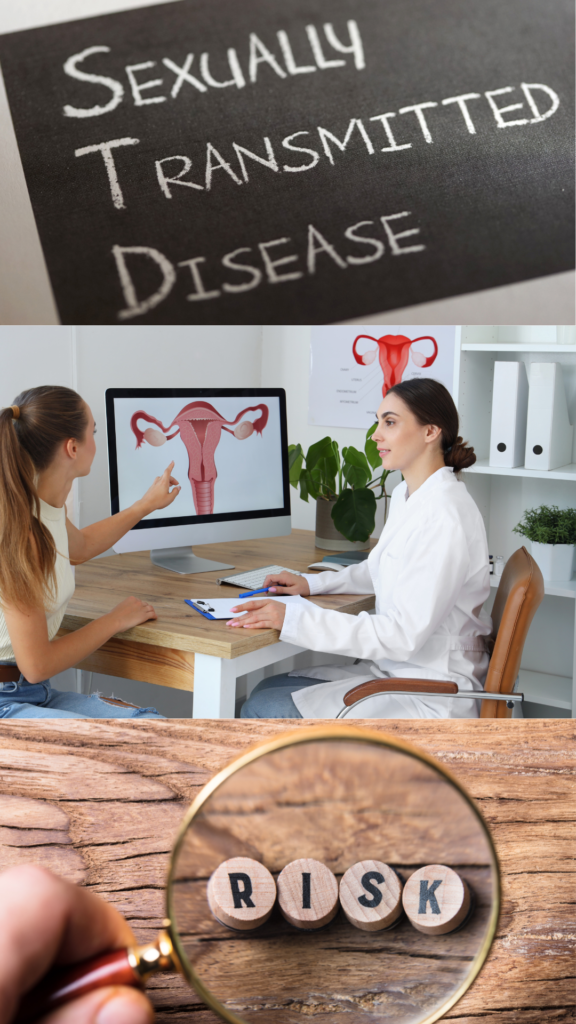Written by Louise Hall, RN
Last updated on 4/9/24
What are STDs?
Sexually transmitted diseases (STD), also known as sexually transmitted infections (STI), are primarily spread through sexual contact with an infected person. Some STDs are also called blood-borne infections; these infections can be spread through contact with an infected person’s blood as well as sexual contact. There are a few STDs that can also spread through contact with infected skin, even without sexual contact. STDs often have a variety of symptoms, including generalized pain, burning during urination, pain during sex, unusual appearing or smelling discharge, and lesions, such as warts or blisters. A person can also have an STD and not experience any symptoms.
Are all the above symptoms caused by STDs?
It is important to note that sometimes people have symptoms similar to those listed above, but it’s not related to an STD. For example, yeast infections are caused by fungi, and bacterial vaginosis is caused by changes in the amount of normal bacteria in the vagina of women. While these infections are more common among those who are sexually active, both can be experienced by women who have never experienced sexually activity. Your doctor can tell what kind of infection you are experiencing, and what kind of treatment it requires, by running some tests and going through a health history with you.
Why should I be tested for STDs?
Getting tested for STDs is important! If you are experiencing symptoms of an STD, this is a good time to schedule an appointment for testing. Untreated STDs can lead to infertility (trouble becoming or staying pregnant) or, if severe, sterility. Some STDs can be passed from a pregnant woman to her unborn child, and some STDs, such as HPV, can lead to cancer.
Even if you aren’t experiencing symptoms, current recommendations state that anyone under 25 who is sexually active should get tested annually, plus anytime they or their partner has sex with another person. For those over 25, anytime you change sexual partners or your partner has sex with another person, you should get tested. If you and your partner can both guarantee that you have not had sex with anyone else since you were last tested, then there isn’t a need to be retested.
Where should I go to get tested, and what should I expect?
When deciding where to get tested, you have several options. You can get tested at your local doctor’s office, by your OB-GYN, or at the local public health department. Some independent clinics also offer STD testing, but you will have to do some research to find out which ones. One thing to consider when deciding where to go is that not all clinics test for the same STDs. Your OB-GYN or doctor’s office will likely offer the most comprehensive testing. This is because some tests require a urine sample, others a blood sample, and some a pelvic exam. Other clinics might not be able to offer such comprehensive testing because it is too expensive, they don’t have the equipment, or they would need to hire additional medical staff that they don’t currently have. As a result, you should always ask what STDs the clinic is testing for. If you received test results saying that you were cleared, make sure to verify what STDs you were tested for. Just because you don’t have chlamydia doesn’t mean you also don’t have HPV.
What happens if I test positive?
If you test positive for an STD, there are different treatments depending on the type of STD that you have. Some STDs are caused by bacteria, such as syphilis, gonorrhea, and chlamydia. These are treated by various kinds of antibiotics. Others are caused by viruses, like HPV, herpes, hepatitis, and HIV, and they are treated by various anti-viral medications or the removal of lesions. Trichomoniasis is caused by a protozoa and is typically treated with a medication called metronidazole.
Some STDs can be treated and cured, but others will go into a latent phase. This means the infection is still in your body, but you won’t have symptoms for awhile. If this is the case, you want to be on the lookout for the symptoms you experienced at first coming back. Any time you have symptoms, you will be contagious. Some STDs are still contagious even if you don’t currently have symptoms, such as HIV. Talk to your doctor to learn his or her recommendations for treatment for yourself and your partner, and to learn how to prevent spreading the disease to others during active infections and any latent phases.
References:
Foundations of Maternal-Newborn Nursing by Sharon Smith Murray and Emily Slone McKinney; pp. 684, 688-690, 911-913.
https://www.cdc.gov/std/prevention/screeningreccs.htm

